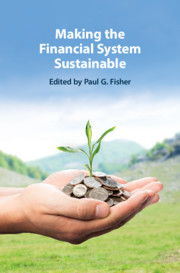Book contents
- Making the Financial System Sustainable
- Making the Financial System Sustainable
- Copyright page
- Contents
- Figures
- Tables
- Boxes
- Contributors
- Foreword
- Preface
- Introduction
- 1 Capitalism Meets Multilateralism
- 2 Public Meets Private
- 3 Central Banking and Climate Change
- 4 Sustainable Finance and Prudential Regulation of Financial Institutions
- 5 Transparency and Accountability Standards for Sustainable and Responsible Investments
- 6 Environmental Risk Analysis by Financial Institutions
- 7 Sustainable Governance and Leadership
- 8 ESG Risks and Opportunities
- 9 Active and Responsible
- 10 Passive-Aggressive or Just Engaged
- 11 Financing a Just Transition
- 12 Sustainable Finance for Citizens
- 13 Individual Impact Investors
- 14 Strengthening Green Finance by Better Integrating the Social Dimensions in the European Union’s Sustainable Finance Laws
- Index
- References
11 - Financing a Just Transition
How to Connect the Environmental and Social Dimensions of Structural Change
Published online by Cambridge University Press: 30 October 2020
- Making the Financial System Sustainable
- Making the Financial System Sustainable
- Copyright page
- Contents
- Figures
- Tables
- Boxes
- Contributors
- Foreword
- Preface
- Introduction
- 1 Capitalism Meets Multilateralism
- 2 Public Meets Private
- 3 Central Banking and Climate Change
- 4 Sustainable Finance and Prudential Regulation of Financial Institutions
- 5 Transparency and Accountability Standards for Sustainable and Responsible Investments
- 6 Environmental Risk Analysis by Financial Institutions
- 7 Sustainable Governance and Leadership
- 8 ESG Risks and Opportunities
- 9 Active and Responsible
- 10 Passive-Aggressive or Just Engaged
- 11 Financing a Just Transition
- 12 Sustainable Finance for Citizens
- 13 Individual Impact Investors
- 14 Strengthening Green Finance by Better Integrating the Social Dimensions in the European Union’s Sustainable Finance Laws
- Index
- References
Summary
Sustainable finance has a key role to play in achieving a just transition - in other words accelerating the shift to a net zero and resilient economy in ways that are fair and inclusive. This chapter sets out why a just transition is essential for the scaling up climate action and achieving wider progress on sustainable development. There is also a compelling rationale for action within the financial system to support a just transition. Institutional investors have been leading the way and over 150 institutions with $10 trillion in assets have now committed to take action. Their aim is to avoid systemic risk and deliver on their fiduciary duties. Policy action is aso needed which mobilises both public and private finance, particularly for place-based action. The chapter closes with a set of priority actions for the European Union.
Keywords
- Type
- Chapter
- Information
- Making the Financial System Sustainable , pp. 237 - 257Publisher: Cambridge University PressPrint publication year: 2020
References
- 2
- Cited by



